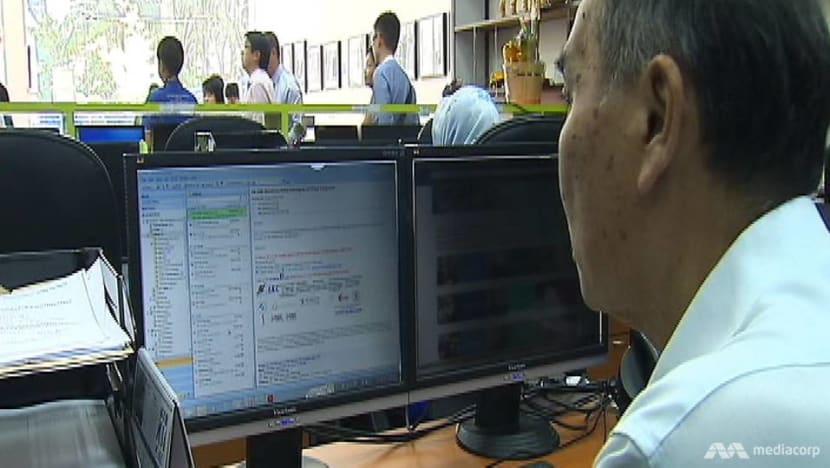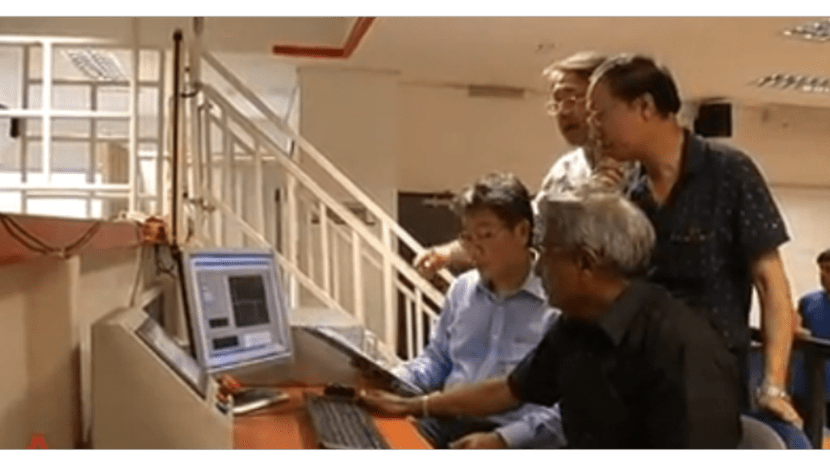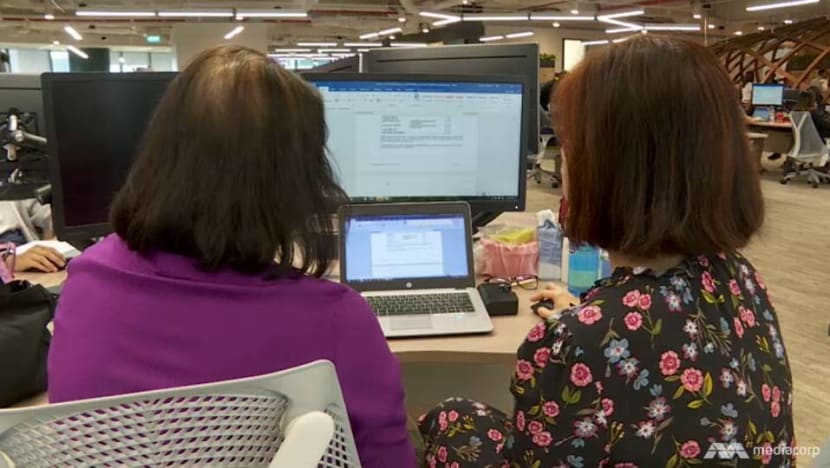commentary Commentary
Commentary: Support for mid-career jobseekers is welcomed. But expectations need to be managed
A lot hinges on the outcomes of the Mid-Career Traineeship scheme but industry leaders recommend that expectations of both parties must be carefully managed, says Nominated Member of Parliament Professor Lim Sun Sun.

File photo of an older office employee.
SINGAPORE: I was but one of their thousands of passengers so they will hardly recall our encounter.
Yet I clearly remember the taxi drivers who engaged me in lively conversations about the state of banking in the region, the evolution of the manufacturing sector, and the challenges of the retail industry.
Each of them left me with a sense of admiration but also regret. They had clearly been successful in their careers, and shared knowledgeably about their areas of expertise.
However, through the unhappy confluence of environmental factors, broader industry transformations and sheer bad luck, they had become jobless around their 40s and, since they were unable to find suitable alternatives, turned to driving taxis to make ends meet.
Each of these trips left me with a heightened appreciation for the plight of the mid-career jobseeker. Despite having worked their way up their respective organisations, the forces of globalisation and digitalisation had left them with skills that are no longer in demand or simply cannot command an equivalent price tag.
READ: Commentary: Employers who lowball jobseekers based on last-drawn salaries are shooting themselves in the foot
LISTEN: How Singapore businesses and workers can thrive in a post-pandemic new normal
Furthermore, their relatively high salaries make them unattractive hires despite their proven track records. In the ruthless world of business, they are sadly not deemed to be value for money.
TIMELY TRAINEESHIP PROGRAMME
I therefore greatly welcome the introduction of the new SGUnited Mid-Career Traineeship Programme provided for by the latest Fortitude Budget. Aiming to roll out 4,000 traineeships for mid-career unemployed locals, this scheme is especially timely as COVID-19 batters our economy and triggers more job losses.
As mature workers, mid-career jobseekers are understandably anxious about the drastic confluence of digital disruptions, outmoded skills and ageism working against them.
Compared to fresh graduates, their needs are more complex as many also constitute the sandwich class, juggling lifestage obligations of parenting and eldercare, thus shouldering more onerous financial commitments.

READ: Commentary: Watch for casual ageism and other signs of caustic attitudes about older workers
Even though they have years of experience under their belts, they will find it harder to pivot, having honed their skills in industries that may be on the decline. And yet, with their maturity and life skills, they still have much to offer our society and ample potential to grow.
A lot therefore hinges on the outcomes of the Mid-Career Traineeship scheme. Companies that successfully retrain and transition such jobseekers can offer a workable template for other employers to do the same.
Trainees who flourish from the scheme will furnish valuable insights into which training approaches are most effective.
Most significantly, positive results for both employers and trainees will help to change stubborn biases around mid-career job seekers being difficult to train and they in turn will be more motivated to consider opportunities in new industry sectors.
READ: Commentary: Digitalisation push in Fortitude Budget is the right move. Much will depend on whether SMEs embrace this opportunity
READ: Commentary: The systematic testing Singapore needs to ditch circuit breakers for good
Now that the government has provided generous funding for these traineeships, what more must be done to ensure their success?
PROVIDING THE RIGHT EXPERIENCE
Principally, industry leaders recommend that expectations of both parties must be carefully managed to heighten mutual understanding and satisfaction with the programme.
The participating companies should be supported with instructive guidelines on how best to integrate and upskill their trainees.
The Ministry of Manpower should also provide some flexibility and support for employers across a group of complementary companies to offer cross-training opportunities.
For example, career portal Mums@Work has successfully experimented with developing consortia of companies in related industries collaborating to collectively train returning talents so that they can be exposed to a broader swathe of skills.
READ: Commentary: Seniors do well at their jobs yet ageist myths and negative stereotypes persist

Trainees can thus explore multiple career paths and better identify their transferable strengths in the process.
With such innovative arrangements, companies can offer their trainees a wider range of skills upgrading opportunities and support each other without incurring prohibitive overheads.
READ: Commentary: Forget work-life balance. It’s all about integration in the age of coronavirus
READ: Commentary: Soon you may be competing with talent globally. The Fortitude Budget is a wake-up call
Companies should also be upfront with their trainees about the potential for longer-term job prospects or the lack thereof and share in advance the kinds of post-traineeship support they can provide.
They would do well to be more explicit about articulating their criteria for retention if they can afford to increase their headcount. That way, the trainees will not feel like they have been led down the garden path.
Besides such substantive issues, the approach that participating companies adopt in hosting these trainees can also make or break a traineeship.
Horror stories abound of job attachment schemes where mature trainees must sign in daily for a visitor’s pass, or who are supervised by very junior colleagues with no managerial experience to speak of.
These socioemotional aspects of mid-career training must be effectively addressed to ensure win-win gains for everyone. Above all, the scheme must accord trainees with a sense of inclusion, purpose and dignity.
MAKING IT COUNT
On their part, trainees must also pull their weight and not regard the traineeship as a paid sabbatical.
Mid-career interns from earlier programmes have admitted to feeling initially demoralised at starting from the bottom all over again. But they also realised that without humility and the willingness to venture into the unknown, they would remain at status quo.
Such mental blocks will invariably impede individual advancement.
Hence, trainees must be psychologically prepared for the programme and offered pointers on how to make the most of their stints. Perhaps peer-to-peer interactions of such mid-career trainees across different companies and sectors can also be organised so that they can share tips and encourage one another.
Fundamentally, these traineeships should offer a combination of substantive skills and career planning competencies that will empower these jobseekers for their next move.
In this regard, the experience of the Singapore Computer Society’s Career Compass programme is highly instructive.
READ: Commentary: The biggest restructuring exercise facing Singapore businesses has just begun
Besides providing training in technical skills relating to growth areas such as artificial intelligence (AI), cyber security and enterprise architecture, the programme also offers career preparatory training in areas such as professional branding, resume building, interview skills and one-to-one mentoring.
Senior Minister Tharman Shanmugaratnam who chairs the newly formed National Jobs Council has announced that they will pay special attention to this group of jobseekers.
With a careful and concerted design of SGUnited Mid-Career Traineeship offerings and actionable guidelines for participating companies and trainees, this scheme can help to critically prepare mid-career workers for the next phase of their professional journeys.
Through thoughtful and well-calibrated support schemes, we can better nurture the mature talents in our midst and most importantly, transform mind sets too.
LISTEN: TraceTogether token and contact tracing apps: Privacy, data usage and other big questions
BOOKMARK THIS: Our comprehensive coverage of the coronavirus outbreak and its developments
Download our app or subscribe to our Telegram channel for the latest updates on the coronavirus outbreak: https://cna.asia/telegram
Lim Sun Sun is Professor of Communication and Technology and Head of Humanities, Arts and Social Sciences at the Singapore University of Technology and Design, and a Nominated Member of Parliament.














